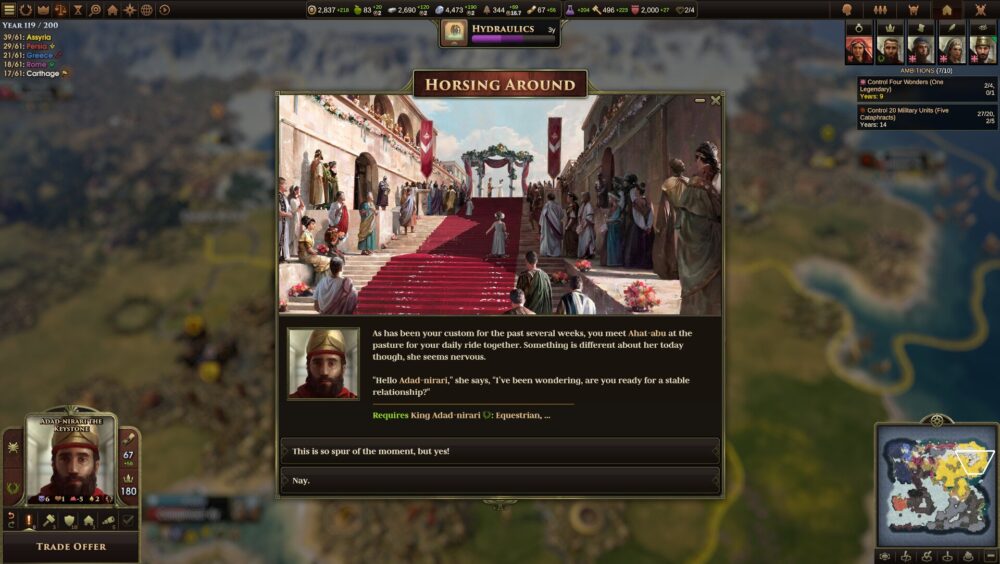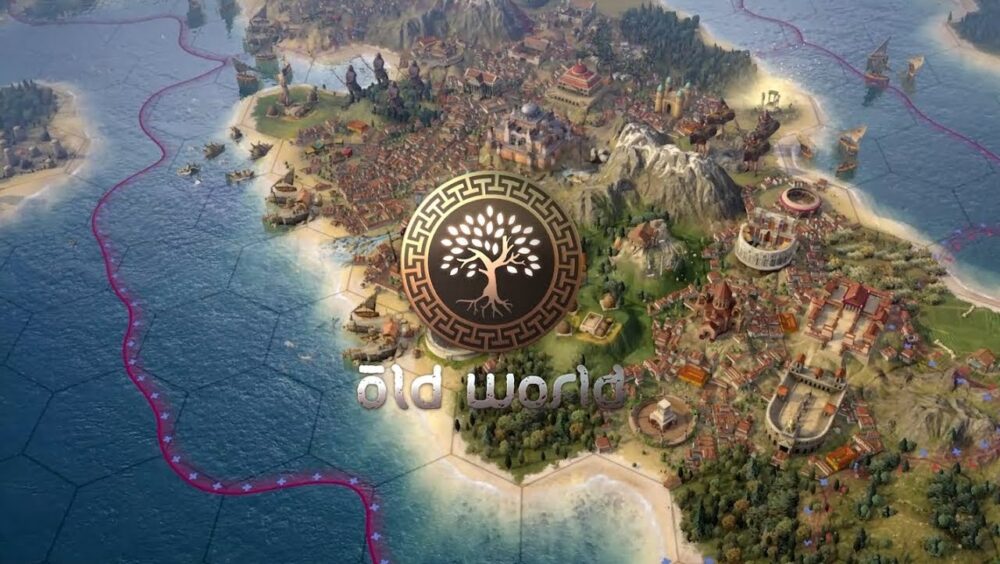“Old World pays dividends to the persistent ruler who is willing to take their time…”
I am Romulus, founder of Roma, the centre of my new Empire and the city that is the heart of power in this world. We start our journey not as soldiers, but as a family of landowners; striving towards the prosperity of our own people using the natural wealth of our new homeland to sustain us. As I explore the lands around me I gather a variety of resources to aid my people’s development. Not 3 years following our settlement, I meet our acquaintances to the south; the trading people of Carthage. I am not yet sure whether they will become friends or foes… In time, my son, Octavius, will take his rightful place on my throne. He will have a challenging world before him in my absence. I hope that he will flourish in his education before that time comes… Alas, I grow weaker and wearier in my age. I feel my life waning. Bless my empire, o Mars, for my people shall seek to prosper beyond my mortal accomplishments…

Ultimately, I was able to stand the test of time and assure my victory through fulfilling my ambitions across 190 years of the Roman Empire. The purpose of my preamble, however, was to highlight what makes Old World a truly unique 4X strategy game; story. Combining the best of Lead Designer Soren Johnson’s pedigree working on the Civilization series and what can perhaps be best described as Crusader Kings lite, OId World follows your family lineage across the early imperial age of mankind, combining strategy and careful decision making as you seek to rule your way to victory. You can employ talented courtiers to aid you in forming alliances, fomenting or resolving unrest, pacifying tribes and other civilizations and teaching your heirs and line to grow them into the future rulers you need for your family’s continued reign. Using marriages for both diplomacy and tactical advantage can help you maintain the happiness of your own people whilst satisfying your peaceful truces with other empires. Imagine Civ with a human element, and you are largely thinking of Old World.

Whilst the Civilization similarities are stark at the base level, with hexes, resource management, tile improvements, diplomacy, military, war and all of the basics you would expect from a Civ-like in place, Old World manages to enhance some elements of its inspiration whilst perhaps overcomplicating others. The aforementioned human aspects and lineage mechanics of the game provide more purpose and meaning behind every action and decision you take, and with only 200 years in the game, each passage of play must be carefully considered and played with purpose. Performing said actions, however, does involve the micromanagement of a vast array of different physical and theoretical resources. You stone and iron are important, of course, but your real point of focus is Orders.

Orders are the currency used to perform actions (not to be confused with gold – the actual currency in the game) on each of your turns. At the start of the game, these orders sparse turn-by-turn, but by the mid-to-late game I found them to be fairly abundant and was glad for the technology which allowed me to sell them off for a hefty pile of gold each turn. Orders make for an interesting mechanic, as they reflect the actual ability of your leader to manage their empire. Instead of an arbitrary ability to command every unit every turn, Orders feel like a more realistic representation of your leadership abilities. Legitimacy is equally important in this sense, too. Your actions are seen by your subjects and judged accordingly. Influencing powerful figures is one aspect of the game, but forgetting your people can lead to rebellions and plots against you. Again, being a good person and befriending everyone on the map can make legitimacy easy, but if you hope to play more aggressively then this resource must be micromanaged to ensure you stay on the throne. Should you die with no heir, the game is over.

Across 200 years, the scope of your technological and civic advancements is far more specific and meaningful than the sprawling tech tree of Civilization. Every new tech you research or law you enact is a distinct upgrade to your Empire, which makes the choices of how to develop even more challenging. Tech, in particular, works on a card-based system. Certain techs are needed to research other, more advanced ones, but each time you choose something to research the options you neglected are shuffled back into a pack and you may be forced to wait some time for those opportunities to arise again. For both techs and resources, trade is always an option too; as is espionage. One of the delights of Old World is the varied approaches you may choose from on your path to victory.

Winning the game can be done in two ways. You can either have the greatest score at the end of the game’s 200 years, based on your cities and their prosperity alongside the wonders you have built and further elements such as your advancements in military and science. The alternative is to fulfil the ambitions of your current leader and those of their ancestors. These grow more and more challenging as the game progresses, and it took me 190 of the 200 years to achieve this victory in my initial game (around 6-7 hours of play, bearing in mind I was learning). In my game, I had no wars and made many friends, with no uprisings or plots to speak of. A pacifist approach is rarely so achievable in a 4X game such as Old World, and though it was often on a knife-edge it was exciting and enticing to maintain the delicate balance. Truly, there is an approach to suit any playstyle; Egypt were evicted from the map on turn 177 by one of my more aggressive counterparts…

Last but not least, it would be amiss not to note the outstanding design elements in this game. Whilst not as bright and glossy as the latest Civ entry, Old World has an era-appropriate and detailed design for every visual element of the game. Outside of the carefully-envisioned units and structures of the game, I was most taken by the geography of the map itself; notably its mountains. The first Civ gets to name any geographical features it finds, and the first time I found a mountain range I was astounded by its realism and scale on the map. Scouting has its merits in Old World in general, as there are artefacts to be found by the intrepid explorer. Furthermore, though, the pleasure of taking in the randomly-generated maps is a delight.
Old World felt daunting in the early game, especially on my first outing with such a wealth and variety of things to do and resources to manage. Persistence pays off, though, as once I was into the meat of the game I could not put it down until my efforts had reached their conclusion. Given an infinite amount of free time, I would happily have started my next playthrough and the next after that right off the bat as well. As I write for you now, I can’t wait to jump back in again when I am done, too. A 4X strategy game which requires you to stick with it and give it a chance to mature, Old World pays dividends to the persistent ruler who is willing to take their time and learn to rule the world their way.
You can buy this game on the Epic Game Store for £31.99 here.
Published and Developed By Mohawk Games
Enjoy the review? want to read more of our reviews? then click right here to be whisked away to the realm of our opinions.








You must be logged in to post a comment.